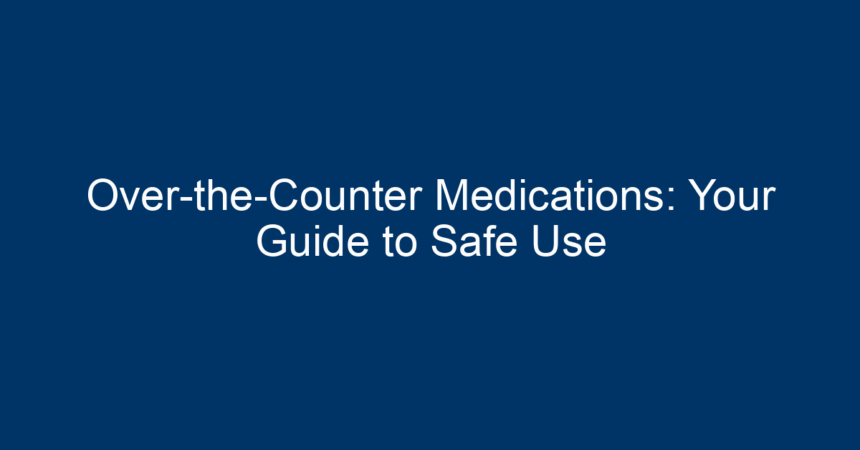When life throws minor health issues your way, over-the-counter medications (OTC) often provide a quick and straightforward solution. Whether it’s alleviating a headache, easing a cold, or managing allergies, OTC medications can be effective allies in your arsenal. However, while these accessible treatments are readily available, understanding their safe use is crucial. In this comprehensive guide, we’ll walk you through everything you need to know about over-the-counter medications, ensuring you can make informed decisions for your health.
What Are Over-the-Counter Medications?
Over-the-counter medications are drugs that can be purchased without a prescription. They include a wide variety of products, ranging from pain relievers and cold medications to antacids and allergy treatments. The advantage of OTC medications is their availability and ease of use, but it’s important to remember that “availability” doesn’t mean “free from risk.”
Common Types of Over-the-Counter Medications
-
Pain Relievers: These include acetaminophen (Tylenol) and nonsteroidal anti-inflammatory drugs (NSAIDs) like ibuprofen (Advil) and naproxen (Aleve). They help relieve pain and reduce fever.
-
Cold and Allergy Medications: This category includes decongestants, antihistamines, and cough suppressants. Medications like diphenhydramine (Benadryl) can relieve allergy symptoms, while others like pseudoephedrine target congestion.
-
Digestive Aids: For digestive issues, OTC medications such as antacids (like Tums) and laxatives (like Metamucil) can be effective.
-
Topical Treatments: These include creams and ointments for minor burns, rashes, or skin irritations, often containing ingredients like hydrocortisone or benzoyl peroxide.
- Vitamins and Supplements: Although not medications per se, many people use OTC vitamins and supplements as part of their health regimen.
The Importance of Usage Instructions
When using over-the-counter medications, always read the label first. Understanding dosing instructions, potential side effects, and contraindications can significantly influence your safety and the effectiveness of the medication.
Dosage Guidelines
The dosing guidelines typically indicate the recommended amount based on age and weight. Consult these guidelines closely to avoid underdosing or overdosing, both of which can lead to ineffective treatment or dangerous side effects.
Expiration Dates and Storage
Check the expiration dates on all OTC medications. Using expired medications can lead to reduced effectiveness and could even pose health risks. Additionally, store these medications in a cool, dry place, away from moisture and heat to maintain potency.
Understanding Side Effects and Interactions
While over-the-counter medications can be beneficial, they are not without risks. Understanding potential side effects and how different medications may interact is essential for safe use.
Identifying Common Side Effects
Common side effects of OTC medications can include:
- Drowsiness (especially with antihistamines)
- Stomach upset (often seen with NSAIDs)
- Dry mouth (common with some allergy medications)
If you experience severe or prolonged side effects, it’s crucial to consult a healthcare provider.
Drug Interactions
Many individuals take multiple medications, including prescription drugs and supplements. Always consult a healthcare provider or pharmacist about potential interactions when considering the addition of an OTC medication. For instance, mixing certain pain relievers with blood thinners can result in serious health issues.
Special Considerations
Certain populations, such as pregnant women, children, and the elderly, require extra caution when using over-the-counter medications.
OTC Medications for Children
Always consult a pediatrician before giving any OTC medication to children. Dosages for children differ significantly from adults and can vary based on weight rather than age. Furthermore, some medications may not be suitable for children under a certain age.
Pregnant and Nursing Mothers
Pregnant and nursing women should be particularly cautious with OTC medications. Some substances can affect fetal development or be excreted in breast milk, potentially harming the infant. Always consult a healthcare provider before using any medication during these times.
Elderly Patients
Elderly patients may experience more side effects or interactions due to the increased number of medications they typically take. Regular review of medications with a healthcare professional is advisable.
Alternatives to Over-the-Counter Medications
While over-the-counter medications can be effective, they are not the only option. Lifestyle changes and natural remedies can often complement or sometimes replace the need for medication.
Natural Remedies
Consider trying natural remedies such as ginger for nausea, peppermint for digestive issues, and honey for coughs. These alternatives can provide relief without the risks associated with OTC medications.
Healthy Lifestyle Choices
Incorporating regular exercise, a balanced diet, and adequate hydration can also promote overall health and may reduce the need for medications.
When to Consult a Healthcare Provider
While many ailments can be treated with over-the-counter medications, there are instances when you should consult a healthcare professional.
Persistent Symptoms
If you have symptoms that last longer than a week, or if they worsen despite using OTC medications, it’s important to seek medical advice to rule out more serious conditions.
Severe Reactions
If you experience severe side effects from an OTC medication, such as difficulty breathing, swelling, or rash, seek immediate medical attention.
Chronic Conditions
If you have a chronic health condition, consult a healthcare provider before starting any new OTC medication to ensure it’s safe and appropriate for your situation.
Conclusion: Your Guide to Safe Use of Over-the-Counter Medications
Over-the-counter medications can be invaluable tools for managing minor health concerns, but their safety hinges on informed usage. Always read labels, understand your specific health needs, and consult a healthcare provider when unsure. With mindful use, you can effectively leverage OTC medications to enhance your well-being safely.
Actionable Insights
- Read Labels Thoroughly: Always familiarize yourself with dosage and side effects.
- Consult Healthcare Providers: Don’t hesitate to ask questions, especially regarding interactions or if symptoms persist.
- Consider Alternatives: Explore natural remedies and lifestyle changes that can complement OTC medications.
- Stay Informed: Regularly update your knowledge about new or recommended OTC products in the market.
By keeping these guidelines in mind, you can ensure safe and effective use of over-the-counter medications, empowering yourself to address minor health challenges effectively.




